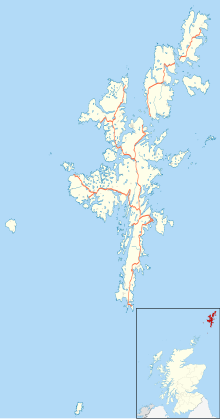Scatsta Airport
|
Scatsta Airport Skaste Lukuhave |
|||||||||||
|---|---|---|---|---|---|---|---|---|---|---|---|

Terminal buildings
|
|||||||||||
| Summary | |||||||||||
| Airport type | Public | ||||||||||
| Operator | Serco UK and Europe on behalf of BP | ||||||||||
| Serves | Shetland | ||||||||||
| Elevation AMSL | 81 ft / 25 m | ||||||||||
| Coordinates | 60°25′58″N 001°17′46″W / 60.43278°N 1.29611°WCoordinates: 60°25′58″N 001°17′46″W / 60.43278°N 1.29611°W | ||||||||||
| Map | |||||||||||
| Location in Shetland | |||||||||||
| Runways | |||||||||||
|
|||||||||||
| Statistics (2016) | |||||||||||
|
|||||||||||
| Passengers | 162,100 |
|---|---|
| Passenger Change 15-16 |
|
Scatsta Airport (IATA: SCS, ICAO: EGPM), is a commercial airport on Shetland in Scotland located 17 nautical miles (31 km; 20 mi) north of Lerwick and 5 mi (8.0 km) southwest of Sullom Voe Terminal.
Scatsta Aerodrome has a CAA Ordinary Licence (Number P777) that allows flights for the public transport of passengers or for flying instruction as authorised by the licensee (BP Exploration Operating Company Limited).
The airport was first developed in 1940 as RAF Scatsta, a Royal Air Force fighter plane base to support Coastal Command flying boat operations at RAF Sullom Voe, and was the most northerly base in the British Isles.
Construction started in Spring 1940, of two runways. One was 1,400 yd (1,300 m) long on a heading of 130 degrees and the other was 1,510 yd (1,380 m) long on a heading of 250 degrees. The first runway was completed in April 1941. The main contractor for the construction of the aerodrome was the Zetland County Council.
In November 1944 Scatsta was used as a support base and diversion point for Lancasters from squadron 617, the famous "Dam Busters", led by Wing Commander J. B. Tait, on Operation Catechism, which bombed and sank the Tirpitz near Håkøy Island, Tromsø.
After World War II Scatsta Aerodrome lay dormant except for the landing of a US Coast Guard HC-130 Hercules on 24 May 1969, in connection with the LORAN navigation station which had been established at the north west end of runway 13/31.
It was abandoned after World War II, but reinstated as a civilian airport in 1978 to support the Shetland oil industry, and the Sullom Voe oil terminal in particular.
...
Wikipedia

